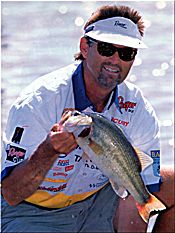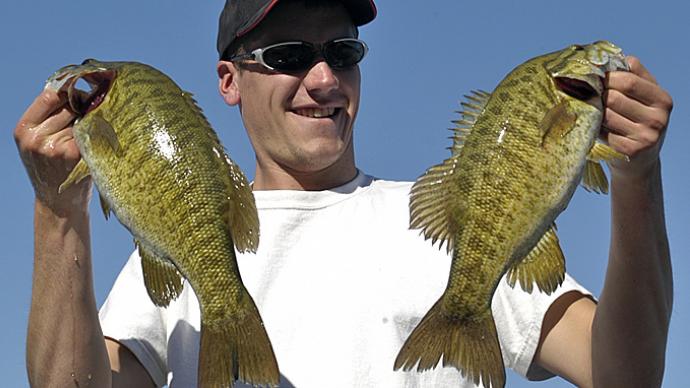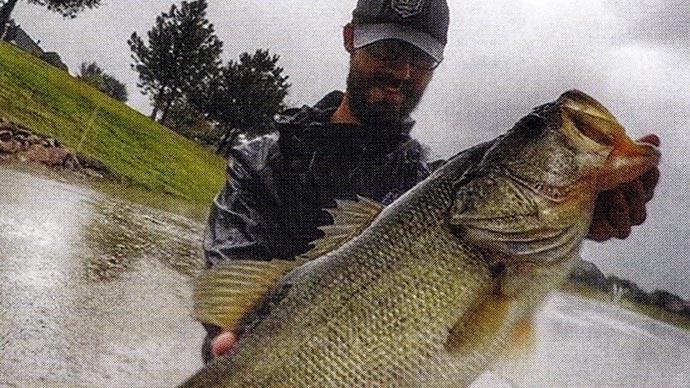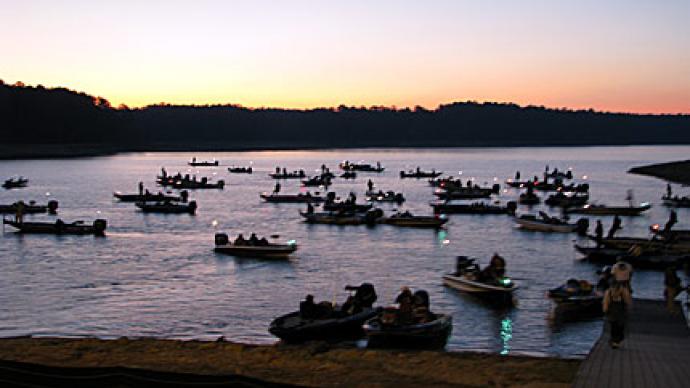
Which came first, the chicken or the egg? It is an ancient riddle relevant to professional bass fishing: which came first, the angler or the sponsors?
Since competitive bass fishing is expensive, sponsors are critical to a professional angler's livelihood. But how do anglers get purveyors to back them? Did they solicit sponsors and then hit the national tours? Or did they win a few tournaments to gain the approval of corporate accountants? Which came first, the chicken or the egg?
Tournament bass fishing is still a relatively young sport. With only a 30- to 40-year history, the tournament industry has yet to outlive many of its pioneers. The business of fishing sponsorships, however, has changed a great deal over the last 20 years.
In the 1970s and 80s, marine and tackle manufacturers seeking to gain a stronghold in the bass fishing market looked to bass fishing tournament trails for credible sources-guys that could put fish in the boat. A single national victory for an angler often meant sponsor opportunities.
Fast-forward to the present day, and credible anglers abound. Thanks to many tournaments, fishing magazines, bass fishing television shows, and the Internet, anyone can be a bass fishing expert.
Marine and tackle companies' needs have changed, too. Instead of just representation in the marketplace, they need valuable feedback about their products and, most importantly, their customers.
Consequently, companies are not just looking for patch-wearing tournament anglers anymore-they are looking for consultants-anglers who can act as a liaison between customers and the company.
Bernie Schultz of Gainesville, Fla., has earned a well-deserved reputation as one of the most marketable anglers in the bass fishing arena. He notes that his role as a sponsored angler has shifted in the last 15 years, and he has worked hard to keep up with the new demands.
"Fifteen years ago, all that was expected of sponsored anglers was to know a company's product line as it pertained to bass fishing," Schultz says. "These days, we must know every aspect of a company's product line. If you are sponsored by a company that makes bass lures and freshwater trout lures, you better educate yourself on the trout products. The same goes for boat and motor companies. You better know all the makes and models and their respective marketplaces."
Schultz says that communicating with everyone, from the general public to the CEO of a major corporation, is essential. "Fifteen years ago, professional anglers walked the halls of sports shows and did demos in the hawg trough. Now, we may sit in a company's office and meet with the president, the marketing staff, or the research and development staff. You will not last long if you sit there like a bump on a log and do not offer valuable feedback on product performance or insight into their consumer base."
Schultz finds his role as a sponsored angler rewarding because it allows him to better a company's product and position in the marketplace. "The marine and tackle business is changing and growing at an accelerated pace. Technology is allowing us to make constant improvements to our equipment. An astute angler keeps up with the development of new materials and improvements in manufacturing. A knowledgeable angler is aware of a company's history and production capabilities. This helps bring feasible improvements to their products and marketing plan."
Performance vs. Promotion
Professional angler Marty Stone of Linden, N.C., has proven that a sharp, educated angler with solid fishing credentials can enter a competitive marketplace and acquire sponsors. But like many young pros, Stone admits to having been confused by the informal structure of climbing the shaky sponsor ladder.
"You have to earn your right to sit down at the dealing table," Stone "The best advice I can give to someone thinking about pursuing sponsors is to carefully document your promotional record -- appearances, print media, television, internet, etc., as well as your fishing performance record. At some point, a company will want to see proof of your ability to communicate, promote and sell above and beyond fishing performance--especially when you try to advance from a product type of sponsorship to a cash incentive program or retainer contract."
Stone cautions that promotional activity should not become a convenient excuse for non-performance. "I am conscious about not overextending myself in a promotional capacity because it can begin to eat away at your time on the water, leading to non-performance. It is a delicate balance that requires detailed attention to time management."
Approaching Sponsors. Three Critical Mistakes
One of the most common mistakes anglers make when approaching sponsors is to ask sponsors, "What can you do for me?" Fishing industry insiders claim this is a blatant mistake.
"A lot of people act as if we owe them something just because they win a tournament," says Bruce Stanton, public relations director for PRADCO. "Not to sound blunt, but fishermen are a dime a dozen. Sponsorship relations are not about what a company can do for a fisherman anymore; they are about what a fisherman can do for a company."
Bart Schad, vice president of sales and Marketing for Ranger Boats, offers the same observation. "So many times, the way an angler approaches me is to say, 'I want a boat sponsor; what can Ranger do for me?'" Schad says.
Schad, who worked for NASCAR before coming to Ranger, says that going to any company in any industry and beating on your chest while bragging about who you are is not a very acceptable way of selling yourself.

"A better approach is to go to a company and prove to them you know something about their product," Schad suggests. "Tell them why you like their product and how you can benefit the company." Another mistake anglers often make is to solicit every company in the industry, looking for the best deal. "I think many newcomers to the sport make the mistake of trying to mass market themselves to too many companies. And they want a deal today," says professional angler Randy Blaukat of Lamar, Mo. "The fishing industry is very leery of guys who just have their hands out for a deal."

Blaukat recommends a different approach to anglers new to the sponsorship business. He suggests pursuing a few companies with a sincere commitment for the long term rather than soliciting dozens of companies for a here today, gone tomorrow deal.
"Know a company's product and believe in it before you knock on the door. Many guys could not even tell you the company's product line they are soliciting," Blaukat says.
Schultz agrees, "It humors me to see anglers running booth to booth at sports shows, giving reps the same pitch with their hands out. These reps eat dinner together at night. They know who these guys are and what they are up to."
This is a phenomenon David Simmons, field promotions coordinator for Yamaha, has experienced as well. "I would not recommend the, 'I will use the company that will pay me the most because all motors are the same approach," Simmons advises. "I would ask that anglers think carefully about who they want to align themselves with and then pursue only that company because they know and believe in the product line."
Finally, Schad asks that anglers be realistic about their requests. "Some guys say, 'I just won a tournament, so I want a free boat and motor.' Put what you are asking for in perspective versus what the company will derive from that investment."
Setting Yourself Apart
Heeding Schad's advice, the golden rule to remember when seeking sponsorships is that when a company invests money in an angler, they want a return on that investment. Anglers must be able to show that they have done something to contribute to the company's bottom line. In today's competitive sponsorship market, anglers must set themselves apart from the masses.
A degree in illustration and advertising, plus a strong background in saltwater fishing, have been unique assets for Bernie Schultz.
| "A good angler can walk a Zara Spook. A great angler can sell a Zara Spook." |
"I bring more to the table than casting and reeling," Schultz says. "I have helped companies design packaging and illustrate catalogs. I am proficient in the saltwater market. I can see the similarities in the fresh and saltwater demographics and be beneficial to companies who want to cross or blend those marketplaces'"
The best way an angler can set himself apart at the beginning of his career is to prove "sweat equity." Freebie work on the front end of a fishing career is a standard operating procedure.
Ask almost any well-known pro about the beginning of their sponsor relationships. The response is accented with stories about sports shows, outdoor expos, "hawg trough" demos, and transporting boats for dealers.
"That is how I learned the ins and outs of the fishing market," Schultz remarks. "At the beginning of my career, I was a 'gopher' for reps. I would set up booths, transport boats, and do demos, and I never got paid a dime. But I listened and learned. I learned about stock keeping units and the importance of product packaging and placement. These are the invaluable tools every angler needs to know to help companies sell products. A good angler can walk a Zara Spook. A great angler can sell a Zara Spook."
A Modern-Day Example: Sean Stickler
Considering that today's sponsor market is more competitive than ever, anglers must maintain a balance of fishing performance with product promotion, and anglers must set themselves apart by demonstrating their value to a company; how does an angler put it together in one complete package?

Sean Stickler, a 39-year-old resident of Fort Lauderdale, Fla., is currently involved in that challenge. Stickler represents what it means to solicit sponsorships in the new millennium.
"I have been very fortunate in the opportunities I have been given in the sponsor marketplace despite my lack of fishing experience," acknowledges Stickler, who started fishing the EverStart Series in 1998 and joined the Wal-Mart FLW Tour in 2000. "I have been surprised by the positive response from companies."
But one look at Stickler's resume, work ethic, professional business practices, and respectful enthusiasm for the sport, it is easily understood why he is a welcome sight to the bass fishing industry and why his flagship sponsors include Fuji, Ranger, and Mercury.
Although 39 could be considered a little late to enter the bass fishing market, Stickler brings a mature business background. He has a business management degree, has started and sold his own business, and has worked as an assistant general manager in another company. His past business dealings have been with corporate giants such as NASA, General Electric, and Boeing.
But this hefty business background does not make him the least pompous in the fishing industry. "My parents instilled in me a strong work ethic. I have always worked from the bottom up. Fishing will be no different. I have only been doing this for a short while. For now, I know where my place is at the bottom. That is how you learn everything you need to know about a business, and it makes you appreciate the opportunities you are given," Stickler says.
And talking about sweat equity, Stickler is not above donating his time to work shows and move boats. He is the media liaison for the Broward County Junior Bass Tournament Trail, which allows kids ages 12 to 17 to compete in tournaments.
Stickler spent his money to travel to the Ranger headquarters in Flippin, Ark., to learn about boat manufacturing and marketing. "How can you represent a product properly if you do not know it inside and out?" Stickler asks.
Stickler also carries his professional business practices over to his fishing correspondence. He documents promotional activity and tournament performances and sends the information to companies. He treats the companies in the fishing business with the same respect that he has for his corporate clients.
The business background and undaunted professionalism that Stickler and others like him bring to the table are helping to elevate the sport of professional bass fishing.
Content provided by Bass Fishing Magazine, the official publication of FLW Outdoors



